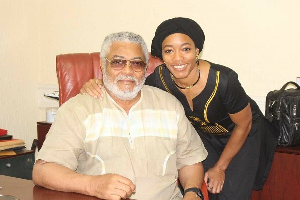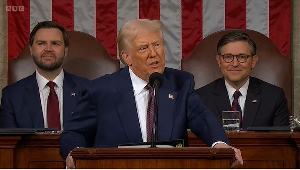The previous issue looked at how the “invisible “ hand can expose financial hoodlums, looking specifically at why there is always the tipping point where your bad financial decisions will expose you. Markets can certainly be unforgiving! Well, since then — Friday, September 14 — 20, 2018 — there has been further developments that support the notion that to build a strong and resilient financial system there should be trust — in all ways.
Financial services providers must trust those they do business with, believing that the dollar (cedi) spent will always generate the expected returns.
In other words, since financial intermediation involves the use of funds that will not necessarily be owned by the service provider, any tilt in the balance of the scale throws intermediation into jeopardy and, therefore, there must be trust.
Trust that the lender and borrower will both fulfil their side of the bargain, for example.
And that is not difficult to understand, is it? It is like providing your money to a bank for safekeeping with an expected interest as well.
At any point in time that you expect your money back, provided that it was not invested for a fixed term and the tenure was still running, you will expect your money back at your call.
Of course, where the tenure has elapsed, your money must be paid to you as well when you need it! That is the ideal situation that the ideal world is expected to promote.
Hence, trust is both ways.
It also means that for the financial institution to be able to make good promises (in the form of contracts) with clients, it must have reliable clients who will also pay back borrowed funds or other credit advances that they have secured from the banks or other financial institutions.
This is the test; the basic, as it were, self- examination that we must all pass or subject ourselves to from time to time, to guide our actions and inactions, as we build a strong financial system together.
Philosophers and psychologists have always looked at behaviours as what inform the meaning structure and interpretations that we give or form of a given situation.
For instance, how will the world be if we all went about our duties borrowing money and not paying back?
The minimum scenarios with this situation would be the denial of people who would have paid back the money the opportunity to have the money and the breakdown in trust that will ultimately affect the delivery of financial services.
Thus, the above describes the principle of the categorical imperative test, which describes how we should test our actions against what the world will become should those actions become a universal law.
Certainly not the best situation if indeed everyone went about borrowing money and not paying back.
But the world of “reality” promotes this, sadly, as people borrow and not pay back. We have given situations of non-payment of loans, which drive some banks to the brink of collapse, and the ripple effects impact on financial markets negatively through various channels.
That reality was reflected in the Monetary Policy Committee (MPC) press statement on Monday, September 24.
In the release, the Chairman of the MPC, Dr Ernest Addison, who is also the Governor of the Bank of Ghana (BoG), stressed on the non-performing loans (NPLs) of banks, and decisions made to ensure that provisions are made for aspects of the NPL that are “toxic” to be written off to avoid the situation of banks overstating profits.
“The quality of loans improved, as industry NPLs ratio eased to 21.3 per cent in August 2018 from 21.9 per cent for the corresponding period in 2017. The BoG has approved a loan write-off of GH¢1.2 billion for the industry, which should reduce the NPL ratio significantly to 18.4 per cent”, the Governor said.
Worryingly, what the Governor’s statement implies is that some GH¢1.2 billion that the banks have provided to people as loans should be written off because these amounts are no longer worth the paper the loan contracts were written on! They have not paid, are not paying and therefore must be taken off the books to avoid carryovers that are really toxic.
Of course, this is the right thing to do, a basic accounting principle of prudence that enjoins financial statement preparers to make provision for such losses by ensuring that all revenue and expenditure are properly recorded and reported.
But why should we do this to the very institutions that we expect so much from in terms of trust? Why would we borrow and not pay back, or make the effort to at least, restructure the facility when we have problems? Trust is both ways and we must always adopt behaviours that promote it; we must all be trustworthy to promote the good in us all.
This brings me to another statement made by a Deputy Governor of BoG, Mrs Elsie Addo Awadzi, on the current moral crisis in the banking sector in Ghana following the action by the central bank to revoke the licenses of seven banks over the past 13 months.
“While some have called it a banking crisis, l choose to call it a moral crisis. A crisis characterised by a breakdown in values, unethical behaviour, disrespect for the sweat and hard work of others who toiled to put their savings in banks, disrespect for employees who toiled day and night to meet targets set for them, a culture of borrowers not paying their debts, a culture of turning the other eye when the wrong things were being done and a culture of building personal empires at the expense of others”, Mrs Awadzi said on September 13, when she delivered a speech during the Ghana Bar Association’s Annual General Conference .
Yes, we must address the moral decadence that is eating away trust in society.
There is no respect, no morals, no trust.
We litter the streets and create a mess, and sadly turn around to blame governments.
According to available records, the Edelman Trust Barometer for 2017 found that in two-thirds of countries, less than 50 per cent trust mainstream institutions of business, government, media, and NGOs to do what is right.
That, indeed, is a crisis of trust.
It is a conduct crisis!
As stated previously, corporations may have ethics codes, ethics officers, ethics committees and ethics training and yet could still not be ethically minded in all their dealings.
We must do more, and commit more to moral uprightness to promote financial stability.
Opinions of Friday, 28 September 2018
Columnist: Bernard Otabil



















